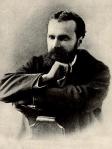
The story continues. It’s the late ’70s, James is about to become a family man (Henry III was born in May ’79), his philosophical future is resolving into sharper focus, his brilliant but troubled sister Alice has begun a steep, inexplicable decline (diagnosed as “neurasthenic”), and his parents are nearing their respective ends.
William is now articulating some of his most distinctive positions. For instance,
On habit: “The great thing is to form habits which then leave the hemispheres free for higher flights…”
On emotion: “No conscious event can occur without some parallel event occurring in the nervous system on which the conscious event depends… the bodily event is the condition, the mental event the consequence. What we esteem the highest is at the mercy of the lowest…”
On consciousness and human evolution: It “means the end of the reign of chance and the beginning of the reign of intelligence.”
On human “powers” and free will: We may profess a “natural faith that our delights and sorrows, loves and hates, aspirations and efforts are real combatants in life’s arena, and not impotent, paralytic spectators of the game.” And: “The trouble with determinism, fatalism, pessimism, the unconscious, and materialism is that in our better hours we feel such limited and limiting forces… to deny our most intimate powers all relevancy…” And: “the inmost nature of the reality is congenial to powers which you possess.”
On attention: “Emotional interests are the great guides to selective attention.”
On life as an adventure, without guarantees: “All that the human heart wants is its chance.”
On effort and free will: “What makes it easy to raise the finger, hard to get out of bed on a cold morning, harder to keep our attention on the insipid image of a procession of sheep… It is a question of getting to the point where we want to will something or other…”
In January 1879 James publishes “Are We Automata?” No, he insists, and would insist to Dan Dennett today with his neuroscientific idea that our minds are assemblages of billions of miniscule cellular robots. But T.H. Huxley’s argument in the affirmative had sounded some characteristsic Jamesian themes too. For example: “In men as in brutes, there is no proof that any state of consciousness is the cause of change in the motion of the matter of the organism.” Remember, on James’s early psychological view we are sad because we cry, not the other way ’round.
But in “Are We Automata?” James is mainly concerned to keep free will in the game, and this seems to require a big role for the emotions as selective, attentive, and integral to the possibility of real human choices and acts. In the process, he says things that might remind you of Cartesian homunculi. The point of consciousness is to allow us to choose, just as a ship’s passenger may choose to seize the helm and “raise, lower, or reef the sail, and so, in small but meaningful ways, direct the voyage. Such a person, taking such actions, cannot be called an automaton.”
No. But neither is it clear that such an understanding of the role emotion plays in our lives is quite consistent with the James-Lange theory. When concept-laden theory confounds our actual experience, James will always opt for the preservation of experience. The details may need working out, but he’s typically happy to go back to the theoretical drawing board rather than deliberately distort perceptual reality in the name of a tidy but misleading picture.
(BTW: James would be fascinated by a story that appeared in the Times science section this week, suggesting the possibility that the Hadron Super-collider might actually interfere with time itself. Perhaps what we do really does alter the space-time causal landscape in tangible ways… does wiggle our dominoes, to return to a strange metaphor that came up in the course of one classroom discussion this week.)
It was during this time that James began experimenting with various psycho-active substances to see what effect they might have in expanding his consciousness and recognition of reality. Hilariously, he read Hegel under the influence of nitrous oxide with predictable results.
1882 was a year of loss. Darwin died, Emerson died. His mother died at age 71. Before the year was out, his father followed suit. James was abroad when his Dad began his final descent, and quickly drafted a letter that preceded him back to Boston. But it did not arrive in time for Henry Sr. to read.
It is a remarkable letter, one which I found it fitting to read to my own father* when his remaining days were few. William was still aboard ship on Dec. 21, continuing his Atlantic transit, when his brother Henry stood at their father’s graveside and read aloud from that letter that began: “Darling Old Father…”
“The letter concludes: “As for us… we will stand by each other and by Alice, try to transmit the torch in our offspring as you did in us… And it comes strangely over me in bidding you goodby how a life is but a day and expresses mainly but a single note, it is so much like the act of bidding an ordinary goodnight. Good night my sacred old Father. If I don’t see you again– Farewell! A blessed Farewell! -Your William”
Richardson rightly observes: “Letters, even undelivered, outlast life. It was a scene a novelist would be hard-pressed to improve.” *It sure was.
No comments:
Post a Comment